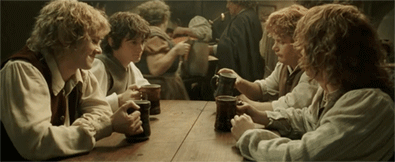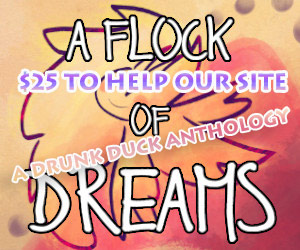
So your comic is coming to end but you still have some small threads to tie up. What better way to bookend the story than with an epilogue? Much like the prologue, the events in the epilogue can take place some time after the concluded events. The main purpose is to provide a sense of closure on the fates of your characters.
A strong epilogue highlights how the events of the narrative went on to impact them in the long run. Take, for instance, The Lord of the Rings - The Return of the King. We could count the fellowship, or what remains of it, reuniting in Rivendell as the ending. However, it continues on beyond that. Because now we’ve shifted into an epilogue, demonstrating how the war over the Ring impacted each of the characters of Middle Earth. We see their fates, but more importantly, how they were affected. We see how much they had to lose to win.
The epilogue is also a good opportunity to drive home the overall theme of your comic, (if your format allows for one). Drawing on the Lord of Rings example again, the theme, whether intentional or not, is ultimately the effects of conflict on the land and the societal changes that it brings. War resulted in magic withdrawing from the land. It now belongs to the brutal reality of man. Heroes returned home, triumphant, yet some were unable to settle; now forever changed by the experience. Those who were on the frontline will never see the world the same way. It is in the epilogue that this theme is really driven home.
Do you plan on having an epilogue in your comic? Let us know in the comment section below! And join us on Sunday evening for our Quackchat at 5:30PM(EST)!
Don’t forget you can now advertise on DrunkDuck for just $2 in whichever ad spot you like! The money goes straight into running the site. Want to know more? Click this link here! Or, if you want to help us keep the lights on you can sponsor us on Patreon. Every bit helps us!
Special thanks to our patrons!!



Justnopoint - Banes - RMccool - Abt_Nihil - PhoenixIgnis - Gunwallace - Cdmalcolm1 - PaulEberhardt - dragonaur - Emma_Clare - FunctionCreep - Eustacheus - SinJinsoku - Smkinoshita - jerrie - Chickfighter - Andreas_Helixfinger - Tantz_Aerine - Epic Saveroom - Genejoke - Davey Do - Spark of Interest - Gullas - Damehelsing - Roma - NanoCritters - Scott D - Bluecuts34 - j1ceasar - Tinchel - PhillipDP - Teh Andeh - Peipei - Digital_Genesis - Hushicho - Sad Demon Comics - JediAnn Solo - Kiddermat - BitterBadger - Palouka - cheeko - Paneltastic - L.C.Stein - Zombienomicon

Bookending with epilogues
Emma_Clare at 12:00AM, May 14, 2021
5 likes!


©2011 WOWIO, Inc. All Rights Reserved Mastodon





PaulEberhardt at 7:33AM, May 14, 2021
Epilogues remind the reader that stories are always just a snippet taken from a larger picture, the beginning and ending being more or less arbitrarily chosen points in time. The story has ended, but life as a whole will go on. This is the other way a good epilogue can give the story or the world it is set in another dimension.
PaulEberhardt at 7:24AM, May 14, 2021
I like epilogues most when they put a story's outcome into perspective by giving it some kind of twist. It's a great way to avoid making happy endings too sugary or bleak endings too dreary. Such a twist can be just for fun of course (the classic scene of an evil supervillain you thought dead climbing out of the crater that used to be his secret lab, muttering something like "Damn! Back to the drawing board!"), but doesn't necessarily have to be comedic. LotR is a good case in point. Steven Erikson's Malazan Book of the Fallen series has lots of examples for epilogues where the events are either commented on by the other (the antagonists') side* or something unforeseen foreboding happens in a different part of that huge world, triggered by the events in the book that has just ended. (* Erikson doesn't write his stories in terms of "good vs. evil" but rather focuses on how in any war morals are always the first casualty. He uses a number of ways to drive this home.)
marcorossi at 5:48AM, May 14, 2021
In my view, there is a difference between what I would call "sagas" (like LOTR) and what I would call "single episode" stories (like most movies). Many traditional concepts about story structure (3 acts, the concepts of prologue and epilogue etc.) make more sense in a "single episode" story. This is because these concepts come from theatre, where in practical terms it was necessary to write single episode stories, and bnot from narrative/epics, where it is more common to have sagas and many different threads of the same story. In a "single episode" story, IMO the epilogue has the function of punctuation, it's a way to tell to the reader: Hey, the story is really ended now.
KAM at 5:47AM, May 14, 2021
I think I did an epiloguey thing in the Third Valkyrie storyline back in 2006. I think I had two pages wrapping some things up after the story ended. The 2006 Halloween Cameo Caper saw me do an epilogue for my characters a 100 & some odd years after the crossover (time travel shenanigans). Oddly enough, Ron of Magical Misfits did his own twist on that epilogue a few years later.
bravo1102 at 5:39AM, May 14, 2021
I tend to do full blown denouement as opposed to epilogue to tie up everything. I think of a true epilogue coming back to see how characters turned out farther down the road. I kind of like the "joyous reunion" type where everyone meets afterward to celebrate and decide how they are to live the rest of their lives. Always thought in LOTR it was the passing of Bilbo and Frodo into the West sequence.
Andreas_Helixfinger at 2:48AM, May 14, 2021
I believe that you can have open-ended sort of epilouges. And I don't mean like cliffhangers, where you leave this blatant promise for more to come, but just leaving the potential of more to come (I believe the ending cutscene of Halo 3 is a fairly good example of this). Where you're having a closure, while at the same time leaving the door still a bit open for more, possibly. That's sort of how I intend to pull things off for many of my own comics. They will have their "Grand Finales" and they will have an aftermath where it's like "well, things are kind of said and done--for now (wink)". So that if I do come up with more stories for these settings and characters, or somebody else does, there is a rebound at the ready where the protagonist/protagonists are back in the game again with more adventures to come around the corner. That's the basic idea I have anyway^^
hushicho at 12:56AM, May 14, 2021
I would agree, except for the unfortunate tendency of Tolkien not to write stories, but instead to compose histories. The Lord of the Rings overstayed its welcome spectacularly, in book form and that of the Jackson films. I tend to advise more along the lines of "leave your audience wanting more" because, as is so often the case with these stories, giving them more because you think that's what they want usually results in them being dissatisfied and feeling like their desires were a mistake. It makes them much more reluctant to ever go back. Once you've gone too far, it burns up the goodwill up to that point astonishingly fast. In my experience, it's far better most of the time to leave an audience saying "they could have told so many more stories" than "wow, they really were out of ideas".
dpat57 at 12:53AM, May 14, 2021
Interesting thoughts! Bold of you to use LOTR: ROTK as an example, considering Jackson whimsically skipped The Scouring of the Shire which painted Perry and Pippin as the real heroes to the Hobbit people. And which in its way took the pressure off Frodo so he could just smile and relax for the first time in ages and enjoy his ale. lol @bravo1102 I've been tying mine up for years now, they never end.
bravo1102 at 12:36AM, May 14, 2021
The epilogues keep becoming full blown sequels. :D